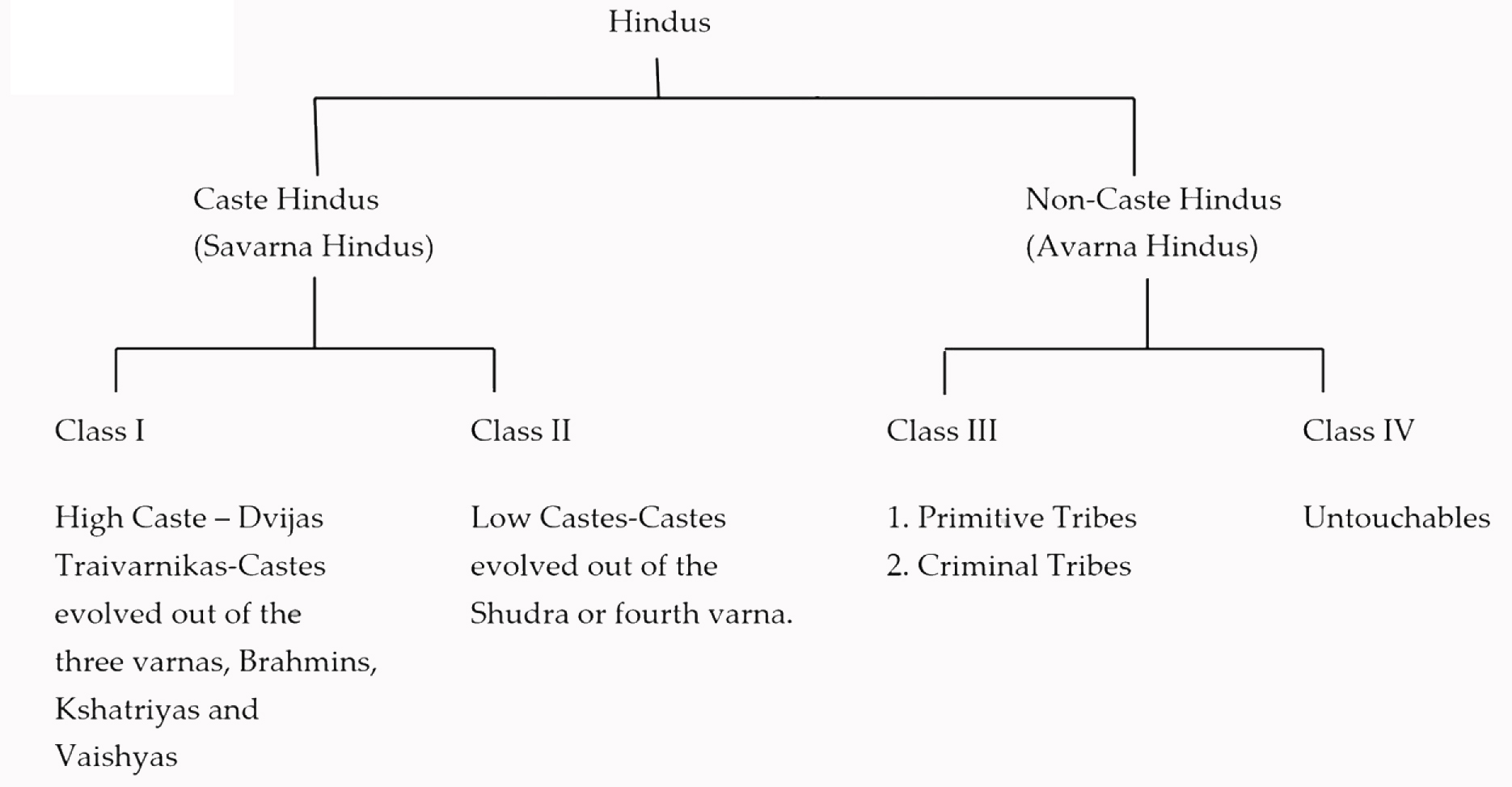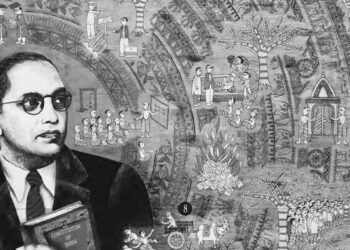Why has the movement of the Untouchables not succeeded? Have they no allies? If there are allies why do they not help and co-operate with the Untouchables? This is a very pertinent question and it is necessary that it should be properly understood. For answering this question, it is essential to have a very clear idea of the Hindu social organization and the classes of which it is composed.
The structure of Hindu society is a very complicated one and it would be difficult for one, whose life has not been woven into it, to know the pattern. Perhaps, a diagrammatic presentation may be helpful. I give below one which, in my judgment, facilitate the understanding of the social structure of the Hindus:
The diagram shows that although there are innumerable castes among the Hindus, they can all be grouped under four classes. Of these four, Class I forms the Herenfolk or the Ruling Class, Classes III and IV form the subject people.
Let us now consider which of these classes can be the natural ally of the Untouchables.
Those in Class I form the privileged classes of the Hindu society. The Hindu social order was created by them. They alone benefit by it while the aim of these in Class I is to save it. Neither by community of interest nor by reason of ideological affinity can the two friends and allies disagree.
What about the Criminal and Primitive Tribes? They have the strongest ground for over-throwing the Hindu Social Order.
 What about the Shudras?
What about the Shudras?
The laws of the Hindu Social Order are as repulsive to Class II, the shudras as they are to Class IV, the Untouchables. It is interesting to know the status of the Shudras in the Hindu society as prescribed by Manu the Law-giver and the Architect of Hindu society. For an easy understanding of the subject, the rules regarding the status of the Shudras are set out below under separate heads:
Manu asks the householders of the Brahmans, Kshatriyas and Vaishyas:
IV. 61 “Let him not dwell in a country where the rulers are Shudras.”
A Shudra is not to be deemed to be a respectable person. For Manu enacts that:
XI. 24 “A Brahmin shall never beg from a Shudra, property for (performing) a sacrifice i.e., for religious purposes.”
All marriages with the Shudra were proscribed. Marriages with a woman belonging to any of three other classes was forbidden. A Shudra was not to have a connection with a woman of the higher classes and an act of adultery committed by a Shudra with her was considered by Manu to be an offence involving capital punishment.
VIII. 374. “A Shudra who has an intercourse with a woman of the higher caste guarded or unguarded shall be punished in the following manner; if she was unguarded, he loses the offending part; if she was guarded then he should be put to death and his property confiscated.”
VIII.20. A Brahmana who is only a Brahman by descent i.e., one who has neither studied nor performed any other act required by the Vedas may, at the king’s pleasure, interpret the law to him i.e., act as the judge, but never a Shudra (however learned he may be).
VIII. 21. The Kingdom of that monarch, who looks on while a Shudra settles the law, will sink low like a cow in the morass.
VIII. 272. If a Shudra arrogantly presumes to preach religion to Brahmins, the king shall have poured burning oil in his mouth and ears.
In the matter of acquiring learning and knowledge Manu ordains as follows:
III. 156. He who instructs Shudra pupils and he whose teacher is a Shudra shall become disqualified for being invited to a Shradha.
IV. 99. He must never read the Vedas in the presence of the Shudras.
Manu’s successors went much beyond him in the cruelty of their punishment of the Shudra for studying the Veda. For instance, Katyayana lays down that if a Shudra overheard the Veda or ventured to utter a word of the Veda, the King shall cut his tongue in twain and pour hot molten lead in his ears.
As to property by the Shudra, Manu enjoins as follows:
X. 129. No superfluous collection of wealth must be made by a Shudra, even though he has power to make it, since a servile man, who has amassed riches, becomes proud, and by his insolence or neglect, gives pain to Brahmins.
VIII. 417. A Brahman may seize without hesitation, if he be in distress for his subsistence, the goods of his Shudra servant.
The Shudra can have only one occupation. This is one of the inexorable laws of Manu. Says Manu:
I. 91. One occupation only, the Lord prescribed to the Shudra, to serve meekly these other three castes (namely Brahmin, Kshatriya and Vaishya).
X. 121. If a Shudra, (unable to subsist by serving Brahmana), seeks a livelihood, he may also seek to maintain himself by attending on a wealthy Vaishya.
X. 122. But let a (Shudra) serve Brahmans, either for the sake of heaven, or with a view to both (this life and the next) for he who is called the servant of a Brahman thereby gains all his ends.
X. 123. The service of Brahmans alone is declared (to be) an excellent occupation for a Shudra for whatever else besides this he may perform will bear him no fruit.
Service by Shudra is not left by Manu to be regulated as a free contract. If the Shudra refused to serve, there is a provision for conscription which runs as follows:
VIII. 413. A Brahmana may compel a Shudra, whether bought or unbought, to do servile work for he is created by the creator to be the slave of a Brahmana.
X. 124. They must allot to him out of their own family (property) a suitable maintenance, after considering his ability, his industry, and the number of those whom he is bound to support.
X. 125. The remnants of their food must be given to him as well as their old household furniture.
A Shudra is required by Manu to be servile in his speech and manner towards the other classes.
VIII. 270. A Shudra who insults a twice born man with gross invectives shall have his tongue cut out; for he is of low origin.
VIII. 271. If he mentions the names and castes of the (twice born) with contumely, an iron nail, ten fingers long, shall be thrust red hot into his mouth.
Manu is not satisfied with this. He wants this servile status of the Shudra to be expressed in the names and surnames of persons belonging to that community. Manu says:
11. 31. Let the first part of a Brahman’s name denote something auspicious, a Kshatriya’s be connected with power, and a Vaishya’s with wealth but Shudra’s express something contemptible.
11. 32. The second part of a Brahmin’s name shall be a word implying happiness, of a Kshatriya’s (a word) implying protection, of a Vaishya’s term expressive of thriving and of a Shudra’s an expression denoting service.”
It is obvious that these three classes are naturally allies. There is every ground for them to combine for the destruction of the Hindu Social Order. But they have not. It is not that no attempt has been made to unite them. The non-Brahmin Party which held the field between 1919-1935 was an attempt to unite them into one political organization to destroy the dominance of the Brahmins who are the architects of the Hindu Social Order and being the chief beneficiaries of it are its strongest supporters.
This was not the only attempt to bring about solidarity among the three classes. Another attempt is being made by the labour leaders particularly the Communists. They preached that there is an identity of interest of the working class, no matter to what community they belong. There must be developed in them class consciousness and class unity. Once united they could employ the terrifying power of their numbers to break down the economic order and once the economic order falls to the ground the social order of the Hindus is bound to go to pieces. What has been the result? The result is that the solidarity has failed to come. The Shudras and the Criminal and Primitive Tribes are more hostile to the Untouchables than they are to the Brahmins. Indeed it is the Shudras whoact as the police force of the Brahmins for repelling the attack of the Untouchables on the Hindu social order. This is a strange phenomenon. But it is a fact. The atrocities that are committed upon the Untouchables, if they commit any breach of the rules and regulations of the established order and of which description has been given are all the doings of the Shudras.
The reasons for this want of solidarity is not far to seek. It is to be found in the system of graded inequality whereby the Brahmin is above everybody, the Shudra is below the Brahmin and above the Untouchable. If the Hindu social order was based on inequality, it would have been over-thrown long ago. But it is based on graded inequality so that the Shudra while he is anxious to pull down the Brahmin, he is not prepared to see the Untouchable raised to his level. He prefers to suffer the indignities heaped upon him by the Brahmins to join the Untouchables for a general leveling down of the social order. The result is that, there is nobody to join the Untouchable in his struggle. He is completely isolated. Not only is he isolated he is opposed by the very classes who ought to be his natural allies. This isolation is one more obstacle in the removal of untouchability.
Source: Dr. Babasaheb Ambedkar Writings and Speeches Vol:5, Published by
Education Department Government of Maharashtra, 1989








